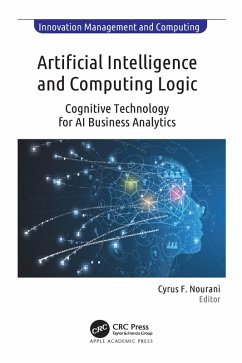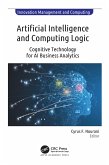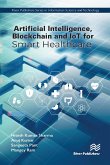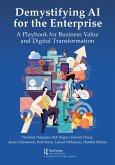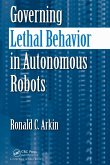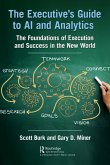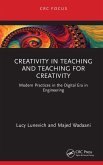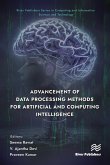Cyrus F. Nourani
Artificial Intelligence and Computing Logic (eBook, PDF)
Cognitive Technology for AI Business Analytics
134,95 €
134,95 €
inkl. MwSt.
Sofort per Download lieferbar

67 °P sammeln
134,95 €
Als Download kaufen

134,95 €
inkl. MwSt.
Sofort per Download lieferbar

67 °P sammeln
Jetzt verschenken
Alle Infos zum eBook verschenken
134,95 €
inkl. MwSt.
Sofort per Download lieferbar
Alle Infos zum eBook verschenken

67 °P sammeln
Cyrus F. Nourani
Artificial Intelligence and Computing Logic (eBook, PDF)
Cognitive Technology for AI Business Analytics
- Format: PDF
- Merkliste
- Auf die Merkliste
- Bewerten Bewerten
- Teilen
- Produkt teilen
- Produkterinnerung
- Produkterinnerung

Bitte loggen Sie sich zunächst in Ihr Kundenkonto ein oder registrieren Sie sich bei
bücher.de, um das eBook-Abo tolino select nutzen zu können.
Hier können Sie sich einloggen
Hier können Sie sich einloggen
Sie sind bereits eingeloggt. Klicken Sie auf 2. tolino select Abo, um fortzufahren.

Bitte loggen Sie sich zunächst in Ihr Kundenkonto ein oder registrieren Sie sich bei bücher.de, um das eBook-Abo tolino select nutzen zu können.
Focusing on the cutting-edge applications of AI cognitive computing from neuromorphic to quantum cognition as applied to AI business analytics, this volume explores AI's importance in managing cognitive processes along with ontological modeling concepts for venturing into new business frontiers.
- Geräte: PC
- ohne Kopierschutz
- eBook Hilfe
- Größe: 10.42MB
Andere Kunden interessierten sich auch für
![Artificial Intelligence and Computing Logic (eBook, ePUB) Artificial Intelligence and Computing Logic (eBook, ePUB)]() Cyrus F. NouraniArtificial Intelligence and Computing Logic (eBook, ePUB)134,95 €
Cyrus F. NouraniArtificial Intelligence and Computing Logic (eBook, ePUB)134,95 €![Artificial Intelligence, Blockchain and IoT for Smart Healthcare (eBook, PDF) Artificial Intelligence, Blockchain and IoT for Smart Healthcare (eBook, PDF)]() Hitesh Kumar SharmaArtificial Intelligence, Blockchain and IoT for Smart Healthcare (eBook, PDF)101,95 €
Hitesh Kumar SharmaArtificial Intelligence, Blockchain and IoT for Smart Healthcare (eBook, PDF)101,95 €![Demystifying AI for the Enterprise (eBook, PDF) Demystifying AI for the Enterprise (eBook, PDF)]() Prashant NatarajanDemystifying AI for the Enterprise (eBook, PDF)51,95 €
Prashant NatarajanDemystifying AI for the Enterprise (eBook, PDF)51,95 €![Governing Lethal Behavior in Autonomous Robots (eBook, PDF) Governing Lethal Behavior in Autonomous Robots (eBook, PDF)]() Ronald ArkinGoverning Lethal Behavior in Autonomous Robots (eBook, PDF)51,95 €
Ronald ArkinGoverning Lethal Behavior in Autonomous Robots (eBook, PDF)51,95 €![The Executive's Guide to AI and Analytics (eBook, PDF) The Executive's Guide to AI and Analytics (eBook, PDF)]() Scott BurkThe Executive's Guide to AI and Analytics (eBook, PDF)31,95 €
Scott BurkThe Executive's Guide to AI and Analytics (eBook, PDF)31,95 €![Creativity in Teaching and Teaching for Creativity (eBook, PDF) Creativity in Teaching and Teaching for Creativity (eBook, PDF)]() Lucy LunevichCreativity in Teaching and Teaching for Creativity (eBook, PDF)20,95 €
Lucy LunevichCreativity in Teaching and Teaching for Creativity (eBook, PDF)20,95 €![Advancement of Data Processing Methods for Artificial and Computing Intelligence (eBook, PDF) Advancement of Data Processing Methods for Artificial and Computing Intelligence (eBook, PDF)]() Advancement of Data Processing Methods for Artificial and Computing Intelligence (eBook, PDF)118,95 €
Advancement of Data Processing Methods for Artificial and Computing Intelligence (eBook, PDF)118,95 €-
-
-
Focusing on the cutting-edge applications of AI cognitive computing from neuromorphic to quantum cognition as applied to AI business analytics, this volume explores AI's importance in managing cognitive processes along with ontological modeling concepts for venturing into new business frontiers.
Dieser Download kann aus rechtlichen Gründen nur mit Rechnungsadresse in A, B, BG, CY, CZ, D, DK, EW, E, FIN, F, GR, HR, H, IRL, I, LT, L, LR, M, NL, PL, P, R, S, SLO, SK ausgeliefert werden.
Produktdetails
- Produktdetails
- Verlag: Taylor & Francis
- Seitenzahl: 286
- Erscheinungstermin: 22. Dezember 2021
- Englisch
- ISBN-13: 9781000400656
- Artikelnr.: 62878914
- Verlag: Taylor & Francis
- Seitenzahl: 286
- Erscheinungstermin: 22. Dezember 2021
- Englisch
- ISBN-13: 9781000400656
- Artikelnr.: 62878914
- Herstellerkennzeichnung Die Herstellerinformationen sind derzeit nicht verfügbar.
Cyrus F. Nourani, PhD, has a national and international reputation in computer science, artificial intelligence, mathematics, virtual haptic computation, enterprise modeling, decision theory, data sciences, predictive analytics economic games, information technology, and management science. In recent years he has been engaged as a research professor at Simon Frasier University in Burnaby, British Columbia, Canada, and at the Technical University of Berlin, Germany, and has been working on research projects in Germany, Sweden, and France. He has many years of experience in the design and implementation of computing systems. Dr. Nourani's academic experience includes faculty positions at the University of Michigan-Ann Arbor, the University of Pennsylvania, the University of Southern California, UCLA, MIT, and the University of California, Santa Barbara. He was a visiting professor at Edith Cowan University, Perth, Australia, and a lecturer of Management Science and IT at the University of Auckland, New Zealand.
Dr. Nourani has taught AI to the Los Angeles aerospace industry and has worked in many R&D and commercial ventures. He has written and coauthored several books. He has over 400 publications in computing science, mathematics, and management science, and he has written several books and has edited several volumes on additional topics, such as pure mathematics; AI, EC, and IT management science; decision trees; and predictive economics game modeling. In 1987, he founded Ventures for computing R&D and was a consultant for such clients such as System Development Corporation (SDC), the US Air Force Space Division, and GE Aerospace. Dr. Nourani has designed and developed AI robot planning and reasoning systems at Northrop Research and Technology Center, Palos Verdes, California. He also has comparable AI, software, and computing foundations and R&D experience at GTE Research Labs.
Dr. Nourani commenced his university degrees at MIT, where he became interested in algebraic semantics. That was pursued with a world-renowned category theorist at the University of California and Oxford University. Dr. Nourani's dissertation on computing models and categories proved to have pure mathematics foundations developments that were published from his postdoctoral times in US and Europe publications.
Dr. Nourani has taught AI to the Los Angeles aerospace industry and has worked in many R&D and commercial ventures. He has written and coauthored several books. He has over 400 publications in computing science, mathematics, and management science, and he has written several books and has edited several volumes on additional topics, such as pure mathematics; AI, EC, and IT management science; decision trees; and predictive economics game modeling. In 1987, he founded Ventures for computing R&D and was a consultant for such clients such as System Development Corporation (SDC), the US Air Force Space Division, and GE Aerospace. Dr. Nourani has designed and developed AI robot planning and reasoning systems at Northrop Research and Technology Center, Palos Verdes, California. He also has comparable AI, software, and computing foundations and R&D experience at GTE Research Labs.
Dr. Nourani commenced his university degrees at MIT, where he became interested in algebraic semantics. That was pursued with a world-renowned category theorist at the University of California and Oxford University. Dr. Nourani's dissertation on computing models and categories proved to have pure mathematics foundations developments that were published from his postdoctoral times in US and Europe publications.
1. Fundamental Notions and Applications of Symbiotic Recursive Pulsative
Systems 2. Cognitive Computing: Quo Vadis? 3. Digital Transformations
Imperatives: Predictive Goal Processes for Business Model Innovation 4.
Toward a Quantum Theory of Cognitive Affect from Poe to Robotic Helpers:
Newton, Arousal, and Covalent Bonding 5. AI Predictive Digital Analytics: A
Model Computing Basis 6. Effect of Digitization on Business Model
Innovation 7. AI Process Description Algebras and Ontology Preservation
Techniques
Systems 2. Cognitive Computing: Quo Vadis? 3. Digital Transformations
Imperatives: Predictive Goal Processes for Business Model Innovation 4.
Toward a Quantum Theory of Cognitive Affect from Poe to Robotic Helpers:
Newton, Arousal, and Covalent Bonding 5. AI Predictive Digital Analytics: A
Model Computing Basis 6. Effect of Digitization on Business Model
Innovation 7. AI Process Description Algebras and Ontology Preservation
Techniques
1. Fundamental Notions and Applications of Symbiotic Recursive Pulsative
Systems 2. Cognitive Computing: Quo Vadis? 3. Digital Transformations
Imperatives: Predictive Goal Processes for Business Model Innovation 4.
Toward a Quantum Theory of Cognitive Affect from Poe to Robotic Helpers:
Newton, Arousal, and Covalent Bonding 5. AI Predictive Digital Analytics: A
Model Computing Basis 6. Effect of Digitization on Business Model
Innovation 7. AI Process Description Algebras and Ontology Preservation
Techniques
Systems 2. Cognitive Computing: Quo Vadis? 3. Digital Transformations
Imperatives: Predictive Goal Processes for Business Model Innovation 4.
Toward a Quantum Theory of Cognitive Affect from Poe to Robotic Helpers:
Newton, Arousal, and Covalent Bonding 5. AI Predictive Digital Analytics: A
Model Computing Basis 6. Effect of Digitization on Business Model
Innovation 7. AI Process Description Algebras and Ontology Preservation
Techniques
